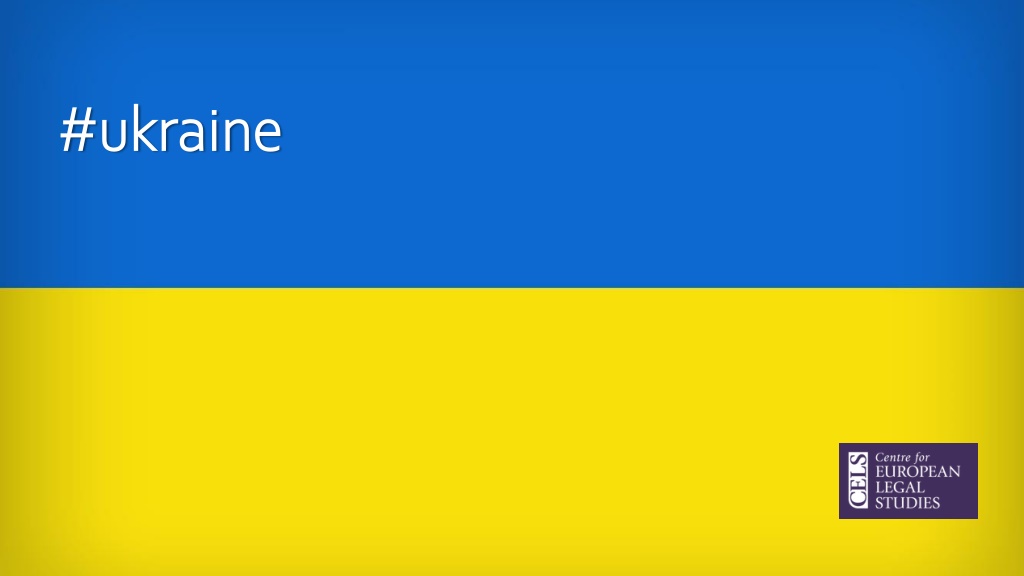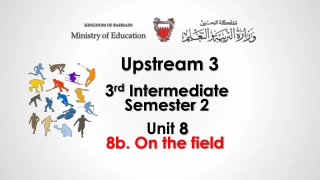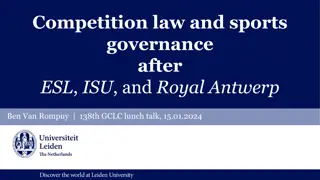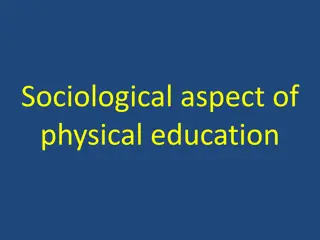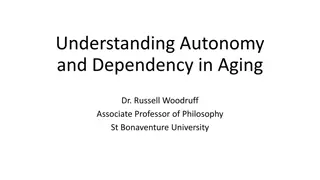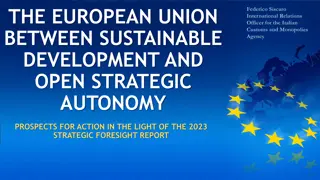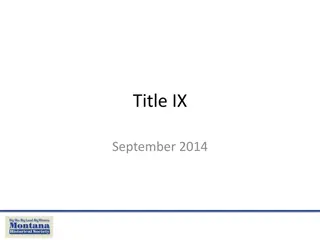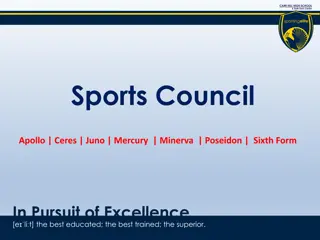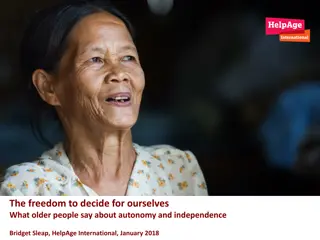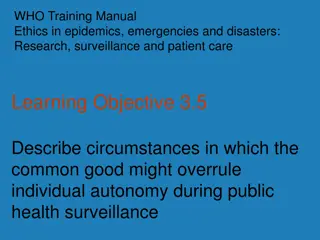Challenges in Sports Governance and Autonomy
The challenges faced in sports governance, including issues of intransparency, corruption, and conflicts of interest. Examining interventions needed for reform within governing bodies to ensure accountability and fairness in sports regulations.
Download Presentation

Please find below an Image/Link to download the presentation.
The content on the website is provided AS IS for your information and personal use only. It may not be sold, licensed, or shared on other websites without obtaining consent from the author.If you encounter any issues during the download, it is possible that the publisher has removed the file from their server.
You are allowed to download the files provided on this website for personal or commercial use, subject to the condition that they are used lawfully. All files are the property of their respective owners.
The content on the website is provided AS IS for your information and personal use only. It may not be sold, licensed, or shared on other websites without obtaining consent from the author.
E N D
Presentation Transcript
#ukraine #ukraine
Saving football from itself: why and Saving football from itself: why and how to re how to re- -make EU sports law make EU sports law Stephen Weatherill University of Oxford
Sports Governance The claim of governing bodies in sport as a matter of principle to autonomy Autonomy in practice - Court of Arbitration for Sport
Sanctions for breach of Financial Fair Play - Milan June 2018, decision of the Adjudicatory Chamber of the UEFA Financial Control Body July 2018, decision of the CAS November 2018, decision of the Adjudicatory Chamber of the UEFA Financial Control Body June 2019, Consent Award (CAS)
The Guardian, 4 October 2013: The Fifa president, Sepp Blatter, has admitted world football cannot "turn a blind eye" to the deaths of hundreds of construction workers in Qatar as the country prepares to host the 2022 World Cup.
Intransparency Absence of adequate representation and accountability Equality Corruption
The endemic conflict of interest of the sports regulator which has commercial incentives
Can we expect governing bodies in sport to reform themselves? If not, who can/ should intervene? And which models of intervention would be justified/ effective? Soft? Hard?
The EUs claim geography; principle; resistance to sanctioning. Conformity with the global trend towards a Brussels effect
The conventional story of EU sports law subjection of the lex sportiva to free movement law and competition law
The limits of CASs autonomy under EU law Case C-519/04P Meca-Medina and Majcen v Commission [2006] Case C-126/97 Eco-Swiss [1999] Also disputes involving EU law which lie beyond CAS s jurisdiction (e.g. third party broadcasters)
The EU is relatively intolerant of sporting autonomy so the lex sportiva must comply with EU law
Free movement law - Article 45 TFEU (workers), Article 56 TFEU (services) Competition (antitrust) law Article 101 TFEU (bilateral and multilateral practices) and Article 102 TFEU (unilateral practices) Non-discrimination on grounds of nationality; and other (horizontally applicable) fundamental rights
The conventional story of EU sports law subjection of the lex sportiva to free movement law and competition law, but with respect for sport s special features
Case C-415/93 Bosman [1995]: [106] In view of the considerable social importance of sporting activities and in particular football in the Community, the aims of maintaining a balance between clubs by preserving a certain degree of equality and uncertainty as to results and of encouraging the recruitment and training of young players must be accepted as legitimate.
Case C-519/04P Meca-Medina and Majcen v Commission[2006]: [45] they do not . necessarily constitute a restriction of competition within the meaning of Article [101], since they are justified by a legitimate objective. Such a limitation is inherent in the organisation and proper conduct of competitive sport and its very purpose is to ensure healthy rivalry between athletes.
C-49/07 MOTOE: Article 102 TFEU precludes a national rule which confers on a legal person, which organises motorcycling events and enters into sponsorship, advertising and insurance contracts, the power to give consent to applications for authorisation to organise such competitions, without that power being made subject to restrictions, obligations and review.
International Skating Union, AT.40208 (2017) Case T-93/18 International Skating Union v Commission (December 2020)
. the protection of the integrity of the sport constitutes a legitimate objective [cites Meca- Medina and Majcen v Commission] .. It is appropriate in particular to examine whether the restrictions in question are inherent in the pursuit of those objectives and proportionate to those objectives .
Case C-333/21 European Superleague Company, pending
So the EU will not accept absolute sporting autonomy - rather, it insists on conditional sporting autonomy (plus a sporting margin of appreciation)
Article 165 TFEU (since 2009): The Union shall contribute to the promotion of European sporting issues, while taking account of the specific nature of sport
But currently EU intervention is typically reactive and ad hoc: it rules only on what may not be done. And it does so only within the scope of free movement/ competition law.
International Skating Union, AT.40208 (December 2017) > FINA swimming - https://www.fina.org/print/50461 (January 2019)
Transfers Mario Monti / Sepp Blatter, 2001 Financial Fair Play - Joaqu n Almunia and Michel Platini, 2012
Conclusions of the Council and representatives of the M.S. on combating corruption in sport, OJ 2019 C416: Sports governing bodies should be able to maintain a high degree of autonomy in fulfilling their role in all fields of sport. This comes with an implicit recognition that any such autonomy must be earned through good governance and upholding the highest standards of integrity in their sport
The basic principles of good governance in sport include, as a minimum requirement, democratic structures, regular and open electoral procedures, competent and ethical organisation and management, accountability and transparency in decision-making and financial operations as well as fairness in dealing with membership, including as regards gender equality and solidarity (ibid)
Committee on Culture and Education of the European Parliament (2021): a European sports model that recognises the need for a strong commitment to integrating the principles of solidarity, sustainability, inclusiveness, open competition and sporting merit good governance, diversity, inclusion, non-discrimination
Resolution of the Council and representatives of the M.S. on the key features of a European Sports Model(2021) : such as freedom of association, pyramidal structure, open system of promotion and relegation, grassroots approach and solidarity, role in national identity, community building and structures based on voluntary activity as well as its social, educational, cultural and health functions .
Win it on the Pitch European Citizens Initiative within the meaning of Art 11(4) TEU & Art 24(1) TFEU, registered 2 Feb 2022, OJ L281/9: Protect a European model of sport based on values, solidarity, sustainability and open competition
Consider the European SuperLeague: . the clubs legal claims . UEFA s legal claims . Case C-333/21 (pending) . Is there a European Model of Sport? . Regulatory intervention
The EU should take a more more proactive role as a sports regulator
Constitutional questions Substantive questions relative expertise and legitimacy
Constitutional questions Article 165 TFEU Articles 53(1), 62, 114 TFEU Article 352 TFEU Article 103 TFEU
Substantive questions relative expertise; legitimacy; risk of fragmentation What value can the EU add?
Dialogue, exchange of best practices, institutional co-operation plus, moving beyond competition law to regulation, targeted legislative proactivity.
The EU is uniquely well placed to improve the quality of governance in sport it should be more proactive but not to the extent of displacing the primary role of governing bodies as regulators of their sport. The aim: improving, not replacing, governance by governing bodies.
The EU (and only the EU) The EU (and only the EU) can save football football from itself from itself can save
